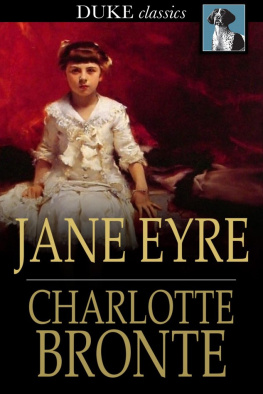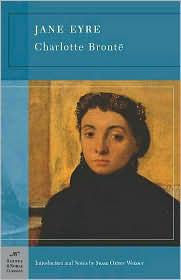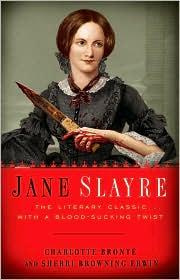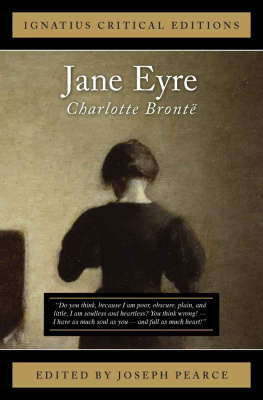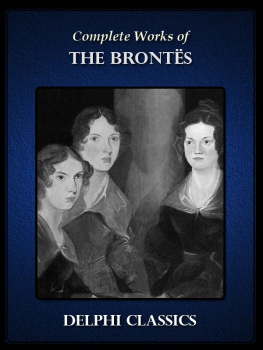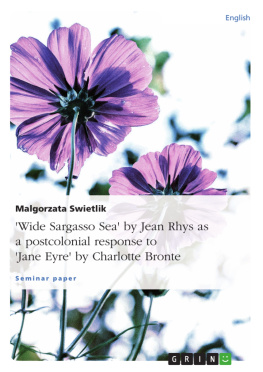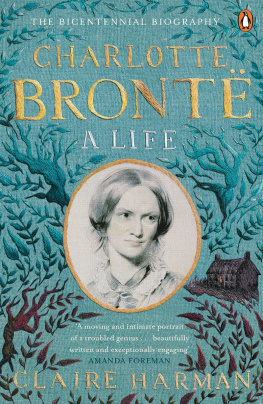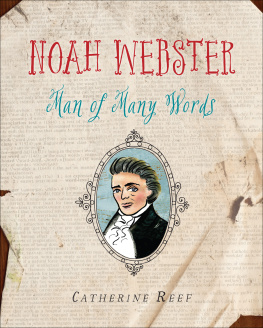Charlotte Bronte - Jane Eyre
Here you can read online Charlotte Bronte - Jane Eyre full text of the book (entire story) in english for free. Download pdf and epub, get meaning, cover and reviews about this ebook. year: 0, genre: Art. Description of the work, (preface) as well as reviews are available. Best literature library LitArk.com created for fans of good reading and offers a wide selection of genres:
Romance novel
Science fiction
Adventure
Detective
Science
History
Home and family
Prose
Art
Politics
Computer
Non-fiction
Religion
Business
Children
Humor
Choose a favorite category and find really read worthwhile books. Enjoy immersion in the world of imagination, feel the emotions of the characters or learn something new for yourself, make an fascinating discovery.
- Book:Jane Eyre
- Author:
- Genre:
- Year:0
- Rating:4 / 5
- Favourites:Add to favourites
- Your mark:
- 80
- 1
- 2
- 3
- 4
- 5
Jane Eyre: summary, description and annotation
We offer to read an annotation, description, summary or preface (depends on what the author of the book "Jane Eyre" wrote himself). If you haven't found the necessary information about the book — write in the comments, we will try to find it.
Jane Eyre — read online for free the complete book (whole text) full work
Below is the text of the book, divided by pages. System saving the place of the last page read, allows you to conveniently read the book "Jane Eyre" online for free, without having to search again every time where you left off. Put a bookmark, and you can go to the page where you finished reading at any time.
Font size:
Interval:
Bookmark:

First published in 1847
ISBN 978-1-62011-504-6
Duke Classics
2012 Duke Classics and its licensors. All rights reserved.
While every effort has been used to ensure the accuracy and reliability of the information contained in this edition, Duke Classics does not assume liability or responsibility for any errors or omissions in this book. Duke Classics does not accept responsibility for loss suffered as a result of reliance upon the accuracy or currency of information contained in this book.
A preface to the first edition of "Jane Eyre" being unnecessary,I gave none: this second edition demands a few words both ofacknowledgment and miscellaneous remark.
My thanks are due in three quarters.
To the Public, for the indulgent ear it has inclined to a plaintale with few pretensions.
To the Press, for the fair field its honest suffrage has opened toan obscure aspirant.
To my Publishers, for the aid their tact, their energy, theirpractical sense and frank liberality have afforded an unknown andunrecommended Author.
The Press and the Public are but vague personifications for me, andI must thank them in vague terms; but my Publishers are definite:so are certain generous critics who have encouraged me as onlylarge-hearted and high-minded men know how to encourage a strugglingstranger; to them, i.e., to my Publishers and the select Reviewers,I say cordially, Gentlemen, I thank you from my heart.
Having thus acknowledged what I owe those who have aided and approvedme, I turn to another class; a small one, so far as I know, butnot, therefore, to be overlooked. I mean the timorous or carpingfew who doubt the tendency of such books as "Jane Eyre:" in whoseeyes whatever is unusual is wrong; whose ears detect in each protestagainst bigotry that parent of crime an insult to piety, thatregent of God on earth. I would suggest to such doubters certainobvious distinctions; I would remind them of certain simple truths.
Conventionality is not morality. Self-righteousness is not religion.To attack the first is not to assail the last. To pluck the maskfrom the face of the Pharisee, is not to lift an impious hand tothe Crown of Thorns.
These things and deeds are diametrically opposed: they areas distinct as is vice from virtue. Men too often confound them:they should not be confounded: appearance should not be mistakenfor truth; narrow human doctrines, that only tend to elate andmagnify a few, should not be substituted for the world-redeemingcreed of Christ. There is I repeat it a difference; and itis a good, and not a bad action to mark broadly and clearly theline of separation between them.
The world may not like to see these ideas dissevered, for it has beenaccustomed to blend them; finding it convenient to make externalshow pass for sterling worth to let white-washed walls vouch forclean shrines. It may hate him who dares to scrutinise and expose to rase the gilding, and show base metal under it to penetratethe sepulchre, and reveal charnel relics: but hate as it will, itis indebted to him.
Ahab did not like Micaiah, because he never prophesied good concerninghim, but evil; probably he liked the sycophant son of Chenaannahbetter; yet might Ahab have escaped a bloody death, had he butstopped his ears to flattery, and opened them to faithful counsel.
There is a man in our own days whose words are not framed to tickledelicate ears: who, to my thinking, comes before the great onesof society, much as the son of Imlah came before the throned Kingsof Judah and Israel; and who speaks truth as deep, with a poweras prophet-like and as vital a mien as dauntless and as daring.Is the satirist of "Vanity Fair" admired in high places? I cannottell; but I think if some of those amongst whom he hurls the Greekfire of his sarcasm, and over whom he flashes the levin-brandof his denunciation, were to take his warnings in time they ortheir seed might yet escape a fatal Rimoth-Gilead.
Why have I alluded to this man? I have alluded to him, Reader,because I think I see in him an intellect profounder and more uniquethan his contemporaries have yet recognised; because I regard himas the first social regenerator of the day as the very masterof that working corps who would restore to rectitude the warpedsystem of things; because I think no commentator on his writingshas yet found the comparison that suits him, the terms which rightlycharacterise his talent. They say he is like Fielding: they talkof his wit, humour, comic powers. He resembles Fielding as an eagledoes a vulture: Fielding could stoop on carrion, but Thackeraynever does. His wit is bright, his humour attractive, but bothbear the same relation to his serious genius that the mere lambentsheet-lightning playing under the edge of the summer-cloud does tothe electric death-spark hid in its womb. Finally, I have alludedto Mr. Thackeray, because to him if he will accept the tributeof a total stranger I have dedicated this second edition of"JANE EYRE."
CURRER BELL.
December 21st, 1847.
I avail myself of the opportunity which a third edition of "JaneEyre" affords me, of again addressing a word to the Public, toexplain that my claim to the title of novelist rests on this onework alone. If, therefore, the authorship of other works of fictionhas been attributed to me, an honour is awarded where it is notmerited; and consequently, denied where it is justly due.
This explanation will serve to rectify mistakes which may alreadyhave been made, and to prevent future errors.
CURRER BELL.
April 13th, 1848.
There was no possibility of taking a walk that day. We hadbeen wandering, indeed, in the leafless shrubbery an hour in themorning; but since dinner (Mrs. Reed, when there was no company,dined early) the cold winter wind had brought with it clouds sosombre, and a rain so penetrating, that further out-door exercisewas now out of the question.
I was glad of it: I never liked long walks, especially on chillyafternoons: dreadful to me was the coming home in the raw twilight,with nipped fingers and toes, and a heart saddened by the chidingsof Bessie, the nurse, and humbled by the consciousness of my physicalinferiority to Eliza, John, and Georgiana Reed.
The said Eliza, John, and Georgiana were now clustered roundtheir mama in the drawing-room: she lay reclined on a sofa by thefireside, and with her darlings about her (for the time neitherquarrelling nor crying) looked perfectly happy. Me, she haddispensed from joining the group; saying, "She regretted to beunder the necessity of keeping me at a distance; but that untilshe heard from Bessie, and could discover by her own observation,that I was endeavouring in good earnest to acquire a more sociableand childlike disposition, a more attractive and sprightly manner something lighter, franker, more natural, as it were shereally must exclude me from privileges intended only for contented,happy, little children."
"What does Bessie say I have done?" I asked.
"Jane, I don't like cavillers or questioners; besides, there issomething truly forbidding in a child taking up her elders in thatmanner. Be seated somewhere; and until you can speak pleasantly,remain silent."
A breakfast-room adjoined the drawing-room, I slipped in there. Itcontained a bookcase: I soon possessed myself of a volume, takingcare that it should be one stored with pictures. I mounted intothe window-seat: gathering up my feet, I sat cross-legged, likea Turk; and, having drawn the red moreen curtain nearly close, Iwas shrined in double retirement.
Font size:
Interval:
Bookmark:
Similar books «Jane Eyre»
Look at similar books to Jane Eyre. We have selected literature similar in name and meaning in the hope of providing readers with more options to find new, interesting, not yet read works.
Discussion, reviews of the book Jane Eyre and just readers' own opinions. Leave your comments, write what you think about the work, its meaning or the main characters. Specify what exactly you liked and what you didn't like, and why you think so.

